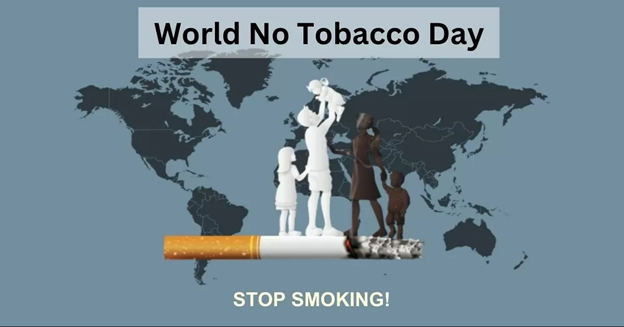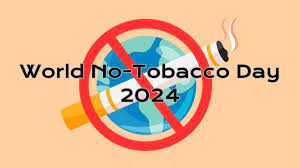
According to the World Health Organization (WHO), although tobacco use is a major public health problem, tobacco products are one of the few openly available commercial products that are virtually unregulated in some countries. They are also the only legally available products that kill up to half of regular users when consumed, as recommended by manufacturers of these products.
The WHO Framework Convention on Tobacco Control (WHO FCTC) also stipulates measures to regulate the contents of tobacco products and their disclosures. To support countries to implement these measures, WHO provides guidance on regulating tobacco products with the aim to reduce their demand and contribute to wider tobacco control objectives, thereby saving lives.

In recent times, regulation of tobacco products has been extended to cover newer products, such as e-cigarettes and through its networks. WHO also provides successive technical assistance to countries to enable them to regulate tobacco products. As one mechanism to draw global attention and to create a platform to young people across the world towards the tobacco epidemic and the preventable death and disease tobacco causes, every year, World No Tobacco day is marked on May 31st. This year’s World No Tobacco Day was also marked under the theme “Protecting children from tobacco industry interference” to protect future generations and ensure that tobacco use continues to decline.
Currently, the Ethiopian Food, Medicine and Healthcare Administration and Control Authority is actively working to ensure public health. The Authority is also implementing various strategies to control bad habits including tobacco use among citizens.
According to the Authority, Tobacco Control Directive Number 771/2021, every manufacturer or importer of tobacco products shall submit the required information as to the content of its tobacco product, the type of each tobacco product, its single product, and ingredients used to produce each brand product that are under the main brand.
However, there are some tobacco manufacturers that failed to effectively fulfill their social responsibilities of ensuring public health.
In relation to this and seizing the international ‘No Tobacco Day 2024’, day as an opportunity Mathiwos Wondu – YeEthiopia Cancer Society (MWECS), highlighted the need to counter the threat of tobacco industry interference, mount advocacy effort, to reduce the negative consequences of tobacco and its health hazards, and obtained successes in tobacco control.
In a press release sent to The Ethiopian Herald, the Society indicated the need to fight the intent of some foreign industries to export tobacco products to African markets.
“As Ethiopia advocates for public health, we are deeply alarmed by the recent push by British American Tobacco’s (BAT) Pakistan Tobacco Company (PTC) to manufacture and export 10-stick cigarette packs, specifically targeting African markets such as Sudan. This move undermines global efforts to protect children and vulnerable populations from the devastating effects of tobacco addiction.”
For Ethiopia, the threat extends beyond the borders of Sudan. Ethiopia is already struggling with significant illicit tobacco products smuggled through its Somali border. The introduction of smaller packs could exacerbate this issue, making it easier for these products to penetrate the Ethiopian market through illicit channels. Additionally, the tobacco industry is waging another war along Ethiopia’s second-longest border [Sudan], further complicating efforts to control the spread of harmful tobacco products.
The problem of illicit tobacco trade in Ethiopia is dire, with significant implications for public health and the economy. According to recent data, illicit tobacco products account for a substantial portion of the market, undermining legal tobacco control efforts.
In 2018, an independent study identified significant figures of tobacco illicit trade in Ethiopia. This widespread illicit trade not only increases tobacco consumption but also deprives the government of valuable tax revenue and complicates enforcement efforts. The proliferation of these illegal products is particularly problematic along Ethiopia’s borders.
“As public health advocates, we stand in solidarity with our Pakistani colleagues in urging the government to resist these pressures and maintain the integrity of their tobacco control laws. Allowing the production of 10-stick packs under the guise of export not only endangers public health for Africans but also sets a dangerous precedent that could undermine tobacco control efforts globally.”
Accordingly, tobacco control laws worldwide are designed to safeguard public health, particularly the health of children. Many countries, including Ethiopia, have implemented regulations that prohibit the sale of cigarette packs smaller than 20 sticks, recognizing that smaller packs make cigarettes more accessible and affordable, especially to children. Reducing the availability of these “kiddie” packs is a crucial measure in decreasing cigarette consumption and preventing the onset of tobacco addiction, disease, and premature death.
However, this company’s recent efforts to amend Pakistan’s Tobacco Advertising, Promotion, and Sponsorship (TAPS) regulations to produce 10-stick packs intended for export to Sudan is a direct threat to these protective measures. This stance is not only hypocritical but it is a serious health challenge to the African youths, the Association reiterated.
“Particularly this time, in Sudan and other African countries, the need for essential resources such as food, medicine, and healthcare is critical. The introduction of smaller, more affordable cigarette packs will only exacerbate the public health crisis, increasing the risk of tobacco addiction among African children and young people.”
Moreover, Sudan is currently grappling with significant security challenges, which further complicate the situation. In such a vulnerable state, the Sudanese population is at even greater risk of falling prey to these aggressive marketing tactics.
“While claiming to adhere to strict regulations in developed countries, some tobacco companies seek to exploit legal loopholes and weaker regulatory environments in developing nations,” the Association elaborated.
In Pakistan, the situation is equally concerning. Despite opposition from key governmental bodies, the company has leveraged its influence to push for legislative changes that would allow the production of these dangerous 10-stick packs. This move has been met with strong local resistance from Pakistani based tobacco control organizations.
“If a product is deemed too dangerous for one country’s children, it is too dangerous for children anywhere. We must protect our future generations from the scourge of tobacco addiction and hold corporations accountable for their exploitative practices,” the statement concluded.
Tobacco industry’s attempt to manufacture and export 10-stick cigarette packs on the pretext of export has become an issue of profound concern among health activists saying that it will attract children towards smoking and weaken the efforts carried out to monitor tobacco consumption, protect people from tobacco smoke, thereby protect public health, Associated Press of Pakistan reported.
In a press release shared by the Society for the Protection of the Rights of the Child (SPARC) recently, the activists expressed grave concerns over its potential impact on children and low-income groups across the nation.
According to Country Head of the Campaign for Tobacco Free Kids, Malik Imran Ahmed, the attempts for 10-stick packs by the tobacco industry are deeply troubling. It will not only undermine the progress made in tobacco control but also directly target children and low-income individuals who are most vulnerable to the harmful effects of tobacco consumption.
Many countries in the world have banned single-stick and small-stick packet sales because they are easier to purchase for children, youth, and low-income groups, and hence the health burden is very high.
Mentioning that the tobacco industry is still making a profit from this situation by indulging in practices such as under-reporting, price adjustment, and pooling its products in the illicit market, the Head said that if 10-stick cigarette packs are allowed for export, there is a strong chance that the tobacco industry will sell them in the local market. Therefore, to keep people safe, it is better not to allow these packets in the first place, he accentuated.
True, saving the lives of individual citizens who are at greater risk of dying prematurely from the consumption of tobacco demands coordinated effort from all. To this end, we have to join hands and strengthen our efforts to save the lives of our children from totally preventable tobacco epidemics and contribute our fair share in transforming our great continent, Africa, into a better place to live and work.
BY TEWODROS KASSA
THE ETHIOPIAN HERALD FRIDAY 7 JUNE 2024





